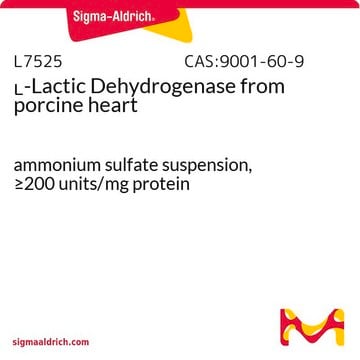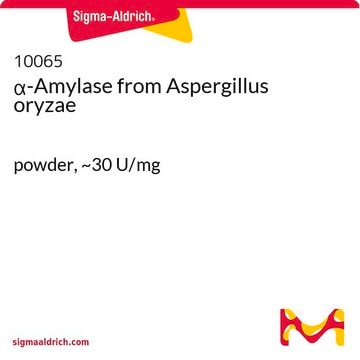PGR1
Abscisic Acid Immunoassay Detection Kit
Quantitate the levels of abscisic acid (ABA) in plant tissue
Synonyme(s) :
Abscisic Acid Detection Kit, Immunoassay Kit
Se connecterpour consulter vos tarifs contractuels et ceux de votre entreprise/organisme
About This Item
Code UNSPSC :
10171502
Nomenclature NACRES :
NA.84
Produits recommandés
Catégories apparentées
Description générale
Abscisic Acid Immunoassay Detection Kit is used to quantitate the levels of abscisic acid (ABA) in plant tissues under normal and stress conditions. The plant growth regulator (PGR) enzyme immunoassay detection kit is a convenient test for the quantitative determination of plant hormones. The test utilizes monoclonal antibodies specific to the targeted hormones.
Application
Abscisic Acid Immunoassay Detection Kit has been used in measuring the levels of abscisic acid (ABA):
- in Sedum alfredii roots
- in Brassica juncea plant
- in Medicago truncatula and Arabidopsis thaliana seedlings
Produit(s) apparenté(s)
Réf. du produit
Description
Tarif
Code de la classe de stockage
10 - Combustible liquids
Certificats d'analyse (COA)
Recherchez un Certificats d'analyse (COA) en saisissant le numéro de lot du produit. Les numéros de lot figurent sur l'étiquette du produit après les mots "Lot" ou "Batch".
Déjà en possession de ce produit ?
Retrouvez la documentation relative aux produits que vous avez récemment achetés dans la Bibliothèque de documents.
G M Banowetz et al.
Hybridoma, 13(6), 537-541 (1994-12-01)
Monoclonal antibodies were prepared against the plant growth regulator abscisic acid (ABA) conjugated to keyhole limpet hemocyanin through C-4. One of these antibodies was characterized for use in a competition fluorescence enzyme-linked immunosorbent assay (F-ELISA). The antibody detected femtomole quantities
Chui E Wong et al.
The Plant journal : for cell and molecular biology, 57(5), 832-845 (2008-11-05)
The transition to flowering is characterized by a shift of the shoot apical meristem (SAM) from leaf production to the initiation of a floral meristem. The flowering process is of vital importance for agriculture, but the associated events or regulatory
EXO modifies sucrose and trehalose responses and connects the extracellular carbon status to growth.
Janina Lisso et al.
Frontiers in plant science, 4, 219-219 (2013-06-28)
Plants have the capacity to adapt growth to changing environmental conditions. This implies the modulation of metabolism according to the availability of carbon (C). Particular interest in the response to the C availability is based on the increasing atmospheric levels
Janina Lisso et al.
PloS one, 6(11), e26982-e26982 (2011-11-11)
The NFX1-LIKE1 (NFXL1) and NFXL2 genes were identified as regulators of salt stress responses. The NFXL1 protein is a nuclear factor that positively affects adaptation to salt stress. The nfxl1-1 loss-of-function mutant displayed reduced survival rates under salt and high
Micha Ofir et al.
Annals of botany, 99(2), 293-299 (2007-01-05)
Survival of many herbaceous species in Mediterranean habitats during the dry, hot summer depends on the induction of summer dormancy by changes in environmental conditions during the transition between the winter (growth) season to the summer (resting) season, i.e. longer
Notre équipe de scientifiques dispose d'une expérience dans tous les secteurs de la recherche, notamment en sciences de la vie, science des matériaux, synthèse chimique, chromatographie, analyse et dans de nombreux autres domaines..
Contacter notre Service technique







